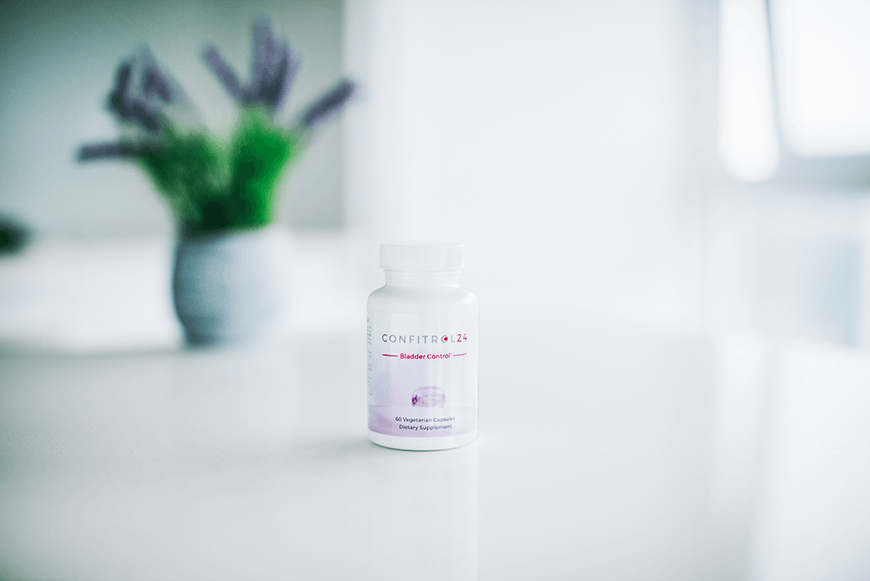Incontinence issues are a common concern for many people1. Several things can contribute to incontinence and several things you can do to help. Changing your diet, doing kegel exercises, and avoiding constipation are great ways to start.
What Causes Incontinence?
There are many causes of incontinence, but the most common cause is weak pelvic floor muscles. These muscles support the bladder and urethra; however, they can lead to leakage when they weaken. Other causes of incontinence include:
- Pregnancy and childbirth: The added weight of pregnancy can put pressure on the pelvic floor muscles, and the act of childbirth can stretch or tear them.
- Being overweight: Excess weight can also put pressure on the pelvic floor muscles.2
- Chronic cough: A chronic cough can put stress on the pelvic floor muscles and lead to incontinence.
- Age: The older you are, the more likely you will have incontinence because of weak pelvic floor muscles.
- Certain medical conditions: Conditions such as diabetes, multiple sclerosis, and Parkinson’s disease can all lead to incontinence.
- Menopause: The loss of estrogen during menopause can cause the pelvic floor muscles to weaken.3
- Prostate surgery: Surgery to remove the prostate can damage the pelvic floor muscles and lead to incontinence.
- Certain medications: Medications such as diuretics, sedatives, and antidepressants can cause incontinence.
- Diabetes: Diabetes can damage the nerves that control the bladder, leading to incontinence.
- Nerve damage: Damage to the nerves that control the bladder can also lead to incontinence.4
There are a variety of treatments for incontinence, but many of them come with undesirable side effects. For example, medication can cause dry mouth, constipation, and dizziness. Surgery is invasive and often requires a lengthy recovery period.
Fortunately, there is a natural way to treat incontinence that is effective and safe. Kegel exercises are a simple yet incredibly effective way to strengthen the pelvic floor muscles and improve incontinence.

What Are Kegel Exercises?
Kegel exercises are simple contraction and relaxation exercises for the pelvic floor muscles. These muscles support the bladder and urethra, and when they are strengthened, they can help prevent leakage.5
To do a Kegel exercise, simply contract the muscles you would use to stop urine flow. Hold the contraction for a count of three. Then, relax for a count of three. Repeat this ten times per session. For best results, aim for three sessions per day.
You can do Kegel exercises anywhere, making them a convenient and discreet way to treat incontinence. Best of all, they are entirely free!
If you’re struggling with incontinence, give Kegel exercises a try. You may be surprised at just how effective they are.
Will Kegel Exercises Help Everyone?
While Kegel exercises are a safe and effective way to treat incontinence for most people, they may not be suitable for everyone. If you have any pain in your pelvic area, consult with a doctor before starting a Kegel exercise program.
Kegel exercises are just one piece of the puzzle when treating incontinence. For the best results, they should be combined with other incontinence treatments, such as diet and lifestyle changes.
Neuromodulation Therapy for Severe Incontinence
If you have tried Kegel exercises and other incontinence treatments with no success, neuromodulation therapy may be an option for you. Neuromodulation therapy is a minimally-invasive treatment that uses electrical stimulation to improve bladder control.
A small device is implanted in the lower back, and electrical impulses are used to stimulate the sacral nerves. These nerves control the bladder and urethra, and by stimulating them, neuromodulation therapy can help to improve incontinence.

Don’t Feel Alone; Incontinence Issues Are More Common Than You Think
You’re not alone if you’re dealing with incontinence; this issue is more common than you may realize. In fact, one in three women experiences incontinence in their lives. And while it’s often thought of as a problem that only affects older adults, incontinence can affect people of all ages.
There are a variety of reasons you may deal with incontinence. The most common cause is weak pelvic floor muscles, leading to leakage. Other causes include pregnancy and childbirth, being overweight, chronic cough, age, certain medical conditions, menopause, prostate surgery, and certain medications.
Don’t Feel Bad if Kegal Exercises and Neuromodulation Don’t Work
Kegel exercises and neuromodulation therapy are two of the most effective treatments for incontinence, but they don’t work for everyone. If you’ve tried these methods without success, don’t feel bad; other options are out there.
Several other incontinence treatments are available, including medication, surgery, and diet and lifestyle changes. Talk to your doctor about the best treatment option for you.
Don’t Let Incontinence Hold You Back
Incontinence can be frustrating and embarrassing, but it doesn’t have to hold you back. With the right treatment, you can live a normal, active life. There are a variety of effective treatments available, so talk to your doctor about what’s best for you.

How Confitrol24 Can Help
Confitrol24 is a natural supplement that helps to strengthen the pelvic floor muscles and improve incontinence. This formula contains a blend of herbs, amino acids, and minerals that work together to provide effective relief.
The ingredients in Confitrol24 have been shown to be clinically effective in treating incontinence. This formula is safe to use and has no side effects. As long as you aren’t allergic to any of the ingredients or have potential interactions with other medications you’re taking, Confitrol24 is an excellent option for treating incontinence.
If you’re looking for a natural way to improve incontinence, try Confitrol24. This supplement can help you regain control and live a normal, active life.
If you’re looking for a natural way to treat your incontinence, Confitrol24 may be right for you. This supplement is safe, effective, and easy to use. Plus, it comes with a money-back guarantee, so you can try it risk-free.
The Formula Behind This Urox Proprietary Blend
Confitrol24 has a Urox proprietary blend that includes:
Lindera Aggregata: This herb is a powerful antioxidant that helps to protect the cells from damage. It also promotes anti-aging effects within your bladder to boost your confidence.
Cratevox: This herb has been used in traditional Chinese medicine for centuries to treat incontinence. It helps to strengthen the pelvic floor muscles and improve bladder control.
Raw Horsetail: This herb is rich in silica, essential for healthy connective tissue. It also helps to detoxify the body and promote urinary health.
How This Urox Blend Can Benefit You
Fewer trips to the bathroom throughout the day: This Urox proprietary blend can help you reduce the number of trips to the bathroom.
Reduced leaks: The ingredients in this formula can help to reduce leakage by strengthening the pelvic floor muscles.
Improved bladder control: This blend can help you regain control over your bladder and improve your quality of life.
Improved sleep: This formula can also help you sleep through the night without waking up to use the bathroom.
Try Confitrol24 For Yourself Today With No Risk
If you’re struggling with incontinence, Confitrol24 may be a good option. This supplement is safe and effective, and it comes with a 67-day money-back guarantee. So why not try it? You have nothing to lose except your incontinence! Click the link below to learn more about Confitrol24.
Up next, check out our blog post, “Try This to Cleanse Your Body and Clear Your Mind”, to feel the best you can this year.
- https://www.webmd.com/urinary-incontinence-oab/everything-managing-incontinence#:~:text=Incontinence%20is%20a%20common%20condition,to%20the%20bathroom%20in%20time
- https://www.news-medical.net/health/Obesity-and-Urinary-Incontinence.aspx#:~:text=Pathology%20behind%20obesity%20and%20urinary%20incontinence&text=Some%20studies%20suggest%20that%20excess,also%20causes%20an%20overactive%20bladder.
- https://www.webmd.com/urinary-incontinence-oab/womens-guide/bladder-control-menopause
- https://www.yalemedicine.org/conditions/neurogenic-bladder-and-incontinence#:~:text=It%20results%20when%20the%20bladder’s,a%20neurogenic%20bladder%2C%20seek%20help.
- https://www.health.harvard.edu/blog/new-recommend-kegels-and-other-treatments-for-incontinence-women-201409177438#:~:text=Kegel%20exercises%20work%20for%20all,the%20Harvard%20Women’s%20Health%20Watch.




